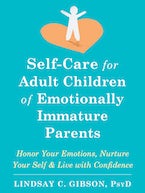Adult children of emotionally immature parents (ACEIPs) have learned to accommodate authority figures by suppressing their own emotional truth. Empathically sensitive, they use amiability to placate powerful people. This doesn’t stop when they come to therapy. Under the anxiety of meeting a new therapist, they will prioritize pleasant social behavior over their real emotions. How can you as therapist connect with someone who reflexively hides their true feelings from authority figures?
First, remember these three things:
- As therapist, you are seen as the dominant authority whether you intend that or not.
- ACEIPs hide their realness out of fear of rejection. They need your explicit support to stop minimizing, rationalizing, and invalidating their inner experiences.
- It is up to you as the therapist to steer away from overintellectualization and deepen an authentic emotional relationship with the client.
It rarely works to directly encourage the client to open up more. Instead, when they show any kind of emotion, ask them to describe their immediate physical sensation (e.g., “What are you experiencing physically as you remember that?”). Ask them for the body’s origin of certain emotions (e.g., “Where in your body do you get that feeling?”). Suggest metaphoric wordplay and sentence completions to open up more emotional and colorful associations (e.g., “Talking to my father is like…”). Metaphors and similes are low-risk door-openers to deeper emotional truths.
Finally, you can create emotionally intimate conversations by asking them about their immediate emotional experience with you. By making it normal to focus repeatedly on emotional experiences, you lower intellectualization and minimization, creating a deeper connection with the ACEIP’s authentic self.

Lindsay C. Gibson, PsyD, is a clinical psychologist in private practice who specializes in individual psychotherapy with adult children of emotionally immature (EI) parents. She writes a monthly column on well-being for Tidewater Women magazine.



 2024 Peace Playbook: 3 Tactics to Avoid Clashes with Your Partner
2024 Peace Playbook: 3 Tactics to Avoid Clashes with Your Partner